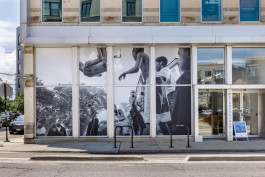
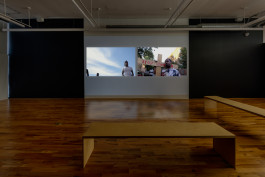
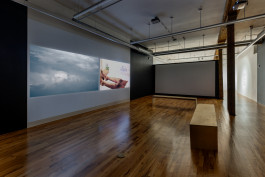
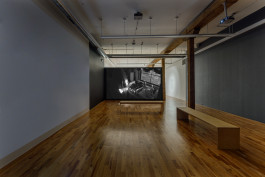
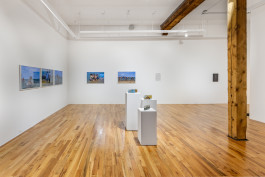
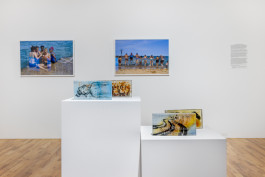
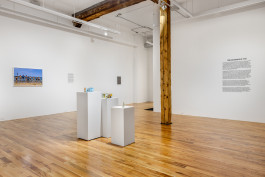
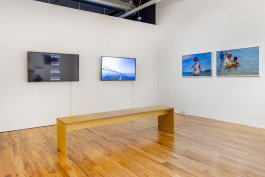
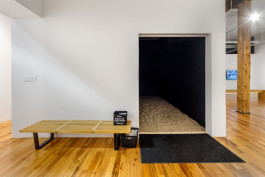
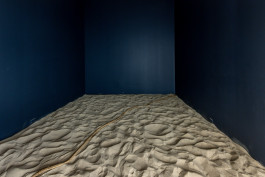
DISARM
Everyday Violence, Every Day
Participate
● Jennifer Nagle Myers’s Open Call
Explore
● Curator’s Note
● Public Programs
● Partner
Jun 23 – Sep 9, 2023
Firebird Community Arts, Lookingglass Theatre Company, Jennifer Nagle Myers, Carlos Javier Ortiz, Jefferson Pinder
DISARM Everyday Violence, Every Day is presented in partnership with Firebird Community Arts and Gun Violence Prevention PAC (G-PAC).
DISARM Everyday Violence, Every Day, installation views at Weinberg/Newton Gallery, 2023; photography by Evan Jenkins
Open Call
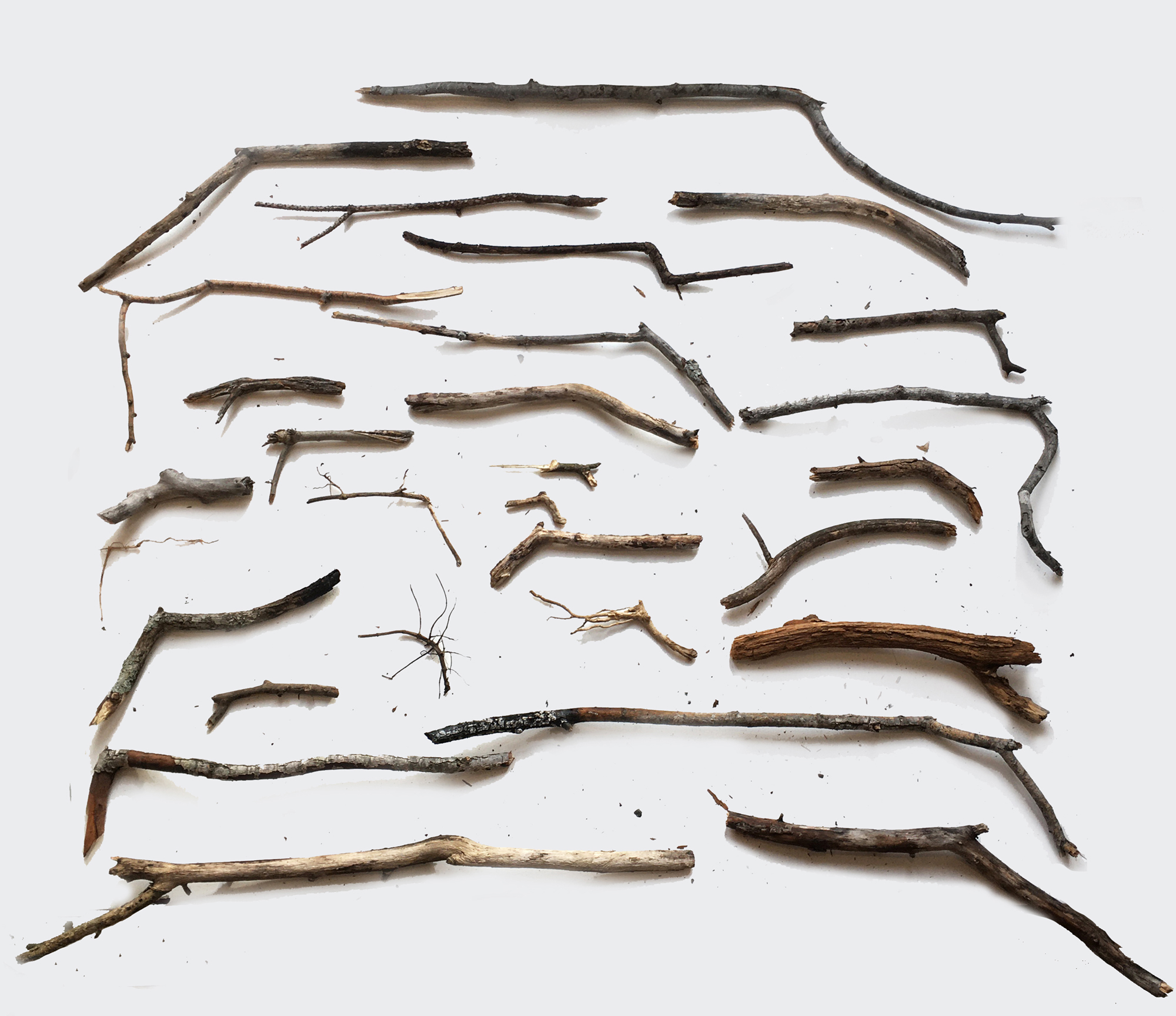
Jennifer Nagle Myers, A City Without Guns, 2015–ongoing, found wooden branches in the shape of guns, 5 x 5 foot grid composed of approximately 40 individual pieces
Dear Community,
I welcome you to create your own version of my artwork A City Without Guns. Your collective version will be displayed in the gallery, growing as it evolves throughout the course of the exhibition. It will be in conversation and community with the one I am sharing.
The instructions are simple: Go out into the world and search the ground for fallen tree branches in the shape of guns. Once you start looking, you will start seeing them. Collect them, one at a time, each time with the intention as you hold it in your hands that we can enter a new paradigm as a culture and live in a city without guns. That our public health crisis of gun violence becomes something we look back at and reflect upon, and that the guns in our cities have returned to being sticks, fallen from our good and trusty friends, the trees – of whom we need many, many more around us.
Do this in the spirit of imagination and trust that even in this type of gesture, something is accomplished. Bring your collection to the gallery and someone there will mount them to the wall to create the community version over the run of the show.
Thank you, and in solidarity,
— Jennifer Nagle Myers
Curator’s Note
Weinberg/Newton Gallery’s final exhibition combines two partnerships with nonprofit organizations that work with and on behalf of those affected by gun violence.
Firebird Community Arts provides a space of recovery from gun-related trauma through glassblowing for Chicago youth in their Project FIRE program. Focused on gun safety, limiting access, and general deterrence, Gun Violence Prevention PAC (G-PAC) works to counter the influence of the gun industry and gun lobby of Illinois.
The exhibition, in turn, has two distinct parts: first, a concise statement on gun culture’s legacy of violence; and second, a memorialization of lives affected by and lost to race-based discrimination and hate during the summer of 1919 in Chicago.
— Nabiha Khan-Giordano, Executive Director
Public Programs
Unless otherwise noted, all events are free, in-person, and open to the public.
Opening Reception
Fri, Jun 23, 5–8pm
CRR19 5th Annual Bike Tour in Bronzeville
Sat, Jul 22, 10am–1pm
The bike tour will begin and end at W 35th Street & S State Street, Chicago, IL 60609
On Saturday, July 22nd, CRR19, in partnership with Organic Oneness, will host its fifth annual commemoration of the events of 1919 and, once more, will feature a historic bike tour. Our 2-hour tour explores some of the history of the Chicago race riots of 1919 and its legacy of residential segregation (arguably, its “origin story”) as well as highlighting the resilience of the Black community. This tour will include the unveiling of some of the markers commemorating some of those killed, created by Chicago’s own Firebird Community Arts.
The tour travels through parts of Bronzeville and Bridgeport, exploring the histories of Black migration, struggle, and institution-building that contributed to the development of Chicago’s Black community. Participants will also learn about the forms of anti-Black racism and segregation that have shaped the development of race relations on the South Side, from 1919 through the present.
Sunset 1919
Hosted by Lookingglass Theatre Company
Thu, Jul 27, 7pm
Eugene Williams Memorial Marker
41° 50.55’ N, 87° 36.535’ W
By establishing an artistic ritual featuring music, movement, art and word, Lookingglass Theatre commemorates the start of the 1919 Chicago race riots, incited by the tragic murder of Eugene Williams, a Black teenager stoned to death after drifting into a “whites only” section of Lake Michigan. Sunset 1919 is meant to peacefully honor the lives of Black humans impacted by the deadly racial attacks that swept the nation that summer, the roots of which stretch back across centuries, and the fruits of which we continue to pluck — a moment in an unbroken line.
William Estrada and Damon Locks
Artmaking Workshop and Sound Performance
Sat, Aug 19, 1–4pm
Artists Damon Locks and William Estrada will facilitate an interactive afternoon of creative collaging of sounds and images. This workshop will put us in dialogue with our city’s history and the possible futures we can imagine together. Join us for a sound performance by Damon Locks followed by a curated playlist that will accompany hands-on artmaking with William Estrada.
Guests will be invited to try their hand at printmaking to create and embellish posters and stickers that can be taken with. We will explore themes of layering stories, sounds, and reflection to make art that can insert history into our everyday lives around our city to provoke conversation and change.
Register here.
CRR19 Panel Discussion
Sat, Aug 26, 1–3pm
Since 2019, panelists Dr. Franklin Cosey-Gay and Dr. Peter Cole have co-directed the Chicago Race Riot of 1919 Commemoration Project (CRR19) believing that this incident of race-based physical violence serves as one of root causes of segregation and associated poverty and gun violence in Chicago. The themes of containment, disruption, and stigmatization carry through from 1919 to present via structural mechanisms including restrictive covenants, redlining, FHA lending that excluded Blacks, the national highway act, urban renewal programs, white flight, and de-industrialization of Chicago. Drs. Cosey-Gay and Cole will be in conversation with artists from Firebird Community Arts who are commissioned by the City of Chicago to create public art pieces commemorating the formative history of Chicago’s Race Riots of 1919. Panelists will surface the root causes of violence that are often not in the public narrative that contribute to 4 billion dollar wealth gap between white and Black Chicagoans.
Register here.
Weinberg/Newton Gallery Closing Party
Sat, Sep 9, 6–9pm
Register here.
Partner
Firebird Community Arts Center works to empower and connect people through the healing practice of glassblowing and ceramics. The organization is primarily in communities with populations that have been impacted by collective or individual trauma. Many of the artists in this exhibition are participants of Firebird’s flagship program, Project FIRE — a glassblowing and trauma recovery program for individuals who have been impacted by gun violence. In addition to creating works of art, Project FIRE participants can heal and excel through mentorships and trauma-informed support groups, case management, and medical treatment.
Gun Violence Prevention PAC (G-PAC) was founded to counter the political influence of the gun industry and their lobby in Springfield. G-PAC raises the resources necessary to protect and elect public officials with the courage to stand up to the gun lobby. The devastation imposed by the gun violence epidemic on our communities and families is unimaginable – it is the price that we are forced to pay for a culture of gun violence that has been allowed to flourish without accountability for far too long.










DISARM
Everyday Violence, Every Day
Participate
● Jennifer Nagle Myers’s Open Call
Explore
● Curator’s Note
● Public Programs
● Partner
Jun 23 – Sep 9, 2023
Firebird Community Arts, Lookingglass Theatre Company, Jennifer Nagle Myers, Carlos Javier Ortiz, Jefferson Pinder
DISARM Everyday Violence, Every Day is presented in partnership with Firebird Community Arts and Gun Violence Prevention PAC (G-PAC).
DISARM Everyday Violence, Every Day, installation views at Weinberg/Newton Gallery, 2023; photography by Evan Jenkins
Open Call

Jennifer Nagle Myers, A City Without Guns, 2015–ongoing, found wooden branches in the shape of guns, 5 x 5 foot grid composed of approximately 40 individual pieces
Dear Community,
I welcome you to create your own version of my artwork A City Without Guns. Your collective version will be displayed in the gallery, growing as it evolves throughout the course of the exhibition. It will be in conversation and community with the one I am sharing.
The instructions are simple: Go out into the world and search the ground for fallen tree branches in the shape of guns. Once you start looking, you will start seeing them. Collect them, one at a time, each time with the intention as you hold it in your hands that we can enter a new paradigm as a culture and live in a city without guns. That our public health crisis of gun violence becomes something we look back at and reflect upon, and that the guns in our cities have returned to being sticks, fallen from our good and trusty friends, the trees – of whom we need many, many more around us.
Do this in the spirit of imagination and trust that even in this type of gesture, something is accomplished. Bring your collection to the gallery and someone there will mount them to the wall to create the community version over the run of the show.
Thank you, and in solidarity,
— Jennifer Nagle Myers
Curator’s Note
Weinberg/Newton Gallery’s final exhibition combines two partnerships with nonprofit organizations that work with and on behalf of those affected by gun violence.
Firebird Community Arts provides a space of recovery from gun-related trauma through glassblowing for Chicago youth in their Project FIRE program. Focused on gun safety, limiting access, and general deterrence, Gun Violence Prevention PAC (G-PAC) works to counter the influence of the gun industry and gun lobby of Illinois.
The exhibition, in turn, has two distinct parts: first, a concise statement on gun culture’s legacy of violence; and second, a memorialization of lives affected by and lost to race-based discrimination and hate during the summer of 1919 in Chicago.
— Nabiha Khan-Giordano, Executive Director
Public Programs
Unless otherwise noted, all events are free, in-person, and open to the public.
Opening Reception
Fri, Jun 23, 5–8pm
CRR19 5th Annual Bike Tour in Bronzeville
Sat, Jul 22, 10am–1pm
The bike tour will begin and end at W 35th Street & S State Street, Chicago, IL 60609
On Saturday, July 22nd, CRR19, in partnership with Organic Oneness, will host its fifth annual commemoration of the events of 1919 and, once more, will feature a historic bike tour. Our 2-hour tour explores some of the history of the Chicago race riots of 1919 and its legacy of residential segregation (arguably, its “origin story”) as well as highlighting the resilience of the Black community. This tour will include the unveiling of some of the markers commemorating some of those killed, created by Chicago’s own Firebird Community Arts.
The tour travels through parts of Bronzeville and Bridgeport, exploring the histories of Black migration, struggle, and institution-building that contributed to the development of Chicago’s Black community. Participants will also learn about the forms of anti-Black racism and segregation that have shaped the development of race relations on the South Side, from 1919 through the present.
Sunset 1919
Hosted by Lookingglass Theatre Company
Thu, Jul 27, 7pm
Eugene Williams Memorial Marker
41° 50.55’ N, 87° 36.535’ W
By establishing an artistic ritual featuring music, movement, art and word, Lookingglass Theatre commemorates the start of the 1919 Chicago race riots, incited by the tragic murder of Eugene Williams, a Black teenager stoned to death after drifting into a “whites only” section of Lake Michigan. Sunset 1919 is meant to peacefully honor the lives of Black humans impacted by the deadly racial attacks that swept the nation that summer, the roots of which stretch back across centuries, and the fruits of which we continue to pluck — a moment in an unbroken line.
William Estrada and Damon Locks
Artmaking Workshop and Sound Performance
Sat, Aug 19, 1–4pm
Artists Damon Locks and William Estrada will facilitate an interactive afternoon of creative collaging of sounds and images. This workshop will put us in dialogue with our city’s history and the possible futures we can imagine together. Join us for a sound performance by Damon Locks followed by a curated playlist that will accompany hands-on artmaking with William Estrada.
Guests will be invited to try their hand at printmaking to create and embellish posters and stickers that can be taken with. We will explore themes of layering stories, sounds, and reflection to make art that can insert history into our everyday lives around our city to provoke conversation and change.
Register here.
CRR19 Panel Discussion
Sat, Aug 26, 1–3pm
Since 2019, panelists Dr. Franklin Cosey-Gay and Dr. Peter Cole have co-directed the Chicago Race Riot of 1919 Commemoration Project (CRR19) believing that this incident of race-based physical violence serves as one of root causes of segregation and associated poverty and gun violence in Chicago. The themes of containment, disruption, and stigmatization carry through from 1919 to present via structural mechanisms including restrictive covenants, redlining, FHA lending that excluded Blacks, the national highway act, urban renewal programs, white flight, and de-industrialization of Chicago. Drs. Cosey-Gay and Cole will be in conversation with artists from Firebird Community Arts who are commissioned by the City of Chicago to create public art pieces commemorating the formative history of Chicago’s Race Riots of 1919. Panelists will surface the root causes of violence that are often not in the public narrative that contribute to 4 billion dollar wealth gap between white and Black Chicagoans.
Register here.
Weinberg/Newton Gallery Closing Party
Sat, Sep 9, 6–9pm
Register here.
Partner
Firebird Community Arts Center works to empower and connect people through the healing practice of glassblowing and ceramics. The organization is primarily in communities with populations that have been impacted by collective or individual trauma. Many of the artists in this exhibition are participants of Firebird’s flagship program, Project FIRE — a glassblowing and trauma recovery program for individuals who have been impacted by gun violence. In addition to creating works of art, Project FIRE participants can heal and excel through mentorships and trauma-informed support groups, case management, and medical treatment.
Gun Violence Prevention PAC (G-PAC) was founded to counter the political influence of the gun industry and their lobby in Springfield. G-PAC raises the resources necessary to protect and elect public officials with the courage to stand up to the gun lobby. The devastation imposed by the gun violence epidemic on our communities and families is unimaginable – it is the price that we are forced to pay for a culture of gun violence that has been allowed to flourish without accountability for far too long.